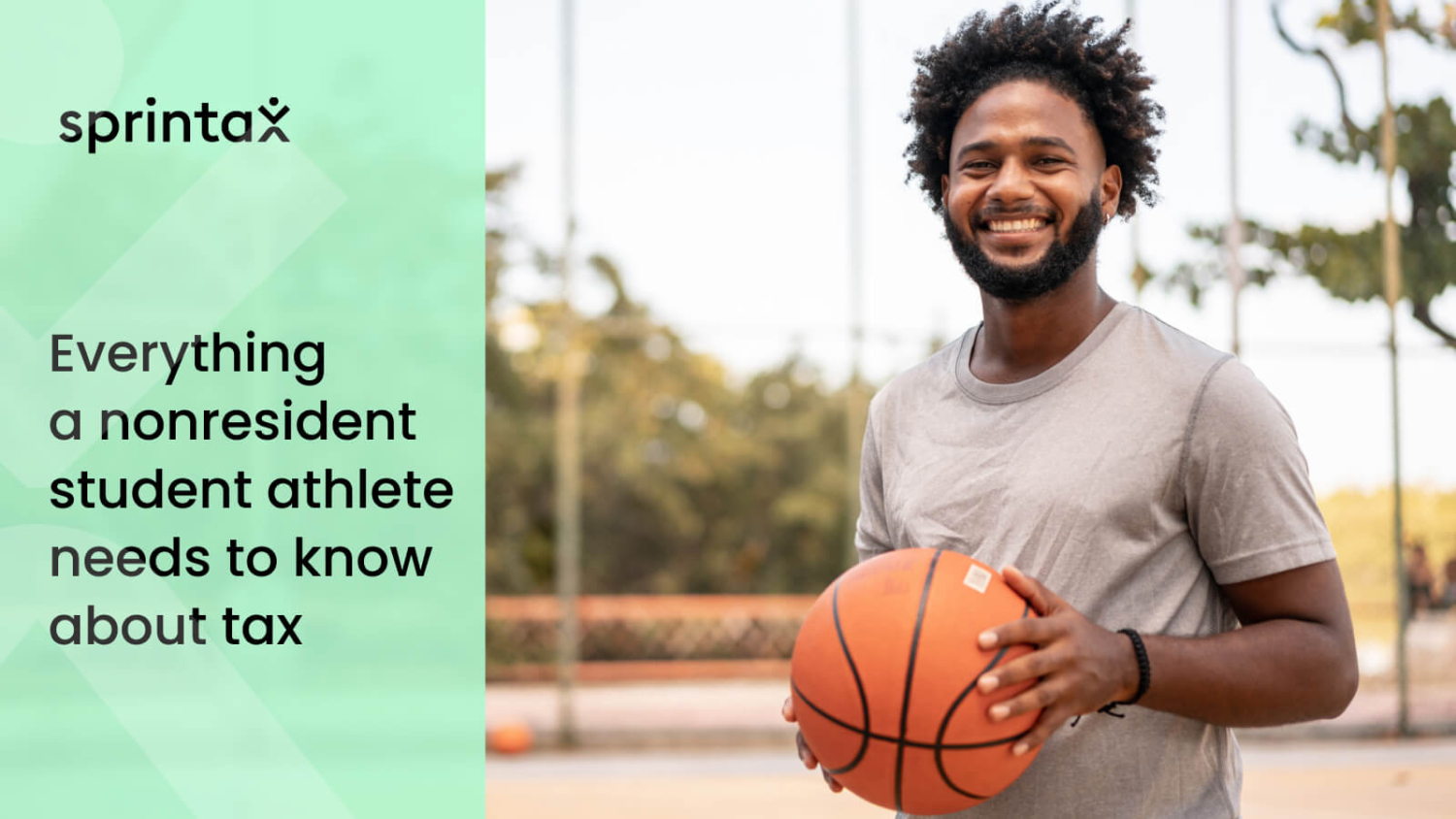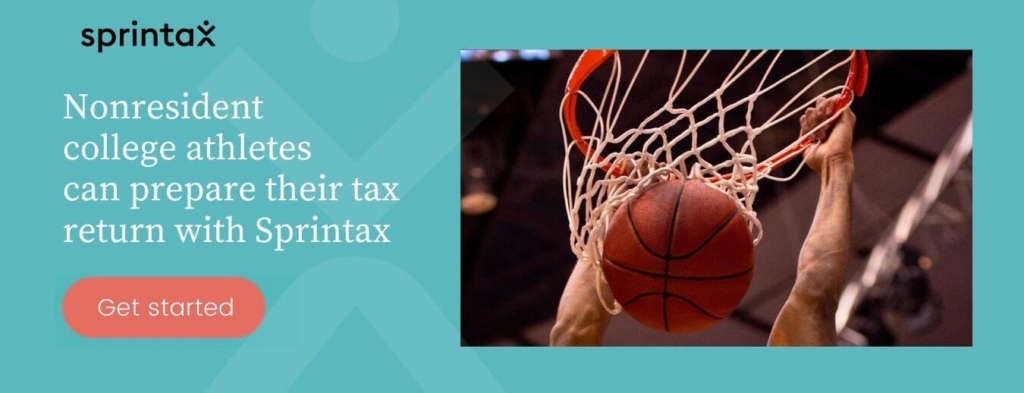Become a tax champion: essential tax information for nonresident student athletes in the US!
In this guide, we will discuss:
- Tax considerations for collegiate nonresident athletes
- How much tax do nonresident athletes pay in the US
- Can an international athlete claim any tax treaty benefits
- How to file a tax return as a foreign sportsperson
- And more!
A few years ago, the NCAA has relaxed rules that had previously prohibited their amateur athletes from earning certain income while competing in college sports.
Because of this, student athletes are now entitled to earn more income than ever before.
Whether it’s scholarship, endorsements or royalties – there are many different streams of income that athletes in the US can pursue.
But here’s the thing.
Not every athlete is eligible to earn income.
Whether international student-athletes are entitled to accept this money will usually depend on the type of visa under which they have traveled to the US.
In a nutshell, the focus of this piece will be to examine the tax implications of earning income as a nonresident student athlete.
So, without further ado… here’s every tax fact a nonresident athlete needs to know about getting paid and paying tax in the US!
Key Blog Takeaways:
- NIL income is taxable at 30% (where no tax treaty applies)
- While you can prepare taxes by yourself, it is always a good idea to file with a nonresident tax filing expert like Sprintax
- Depending on if you earned income, you may need to file a 1040-NR (you’ll need to file a Form 8843 even if you didn’t earn income).
- You should have all your tax documents by the end of January of the year you file.
- The tax deadline is April 15, 2025.
Which athletes are residents or nonresidents for tax in the US?
Let’s start with the difference between being a resident or nonresident alien for tax purposes in the US.
This is a crucial consideration for any foreign individual in the US and a solid jumping off point if you are trying to work out your tax responsibilities and obligations.
In brief, a resident alien is typically taxed on their worldwide income, the same as a US citizen.
Meanwhile, nonresident aliens must only pay federal tax on US sourced income.
Nonresidents are also required to file tax documents to account for each year they spend in the US – even if no income was earned.
You will typically be considered a nonresident for tax purposes if you are not a US citizen, you do not have a green card and you can’t pass the substantial presence test.
Learn more about determining your residency status here.

What types of income are nonresident athletes entitled to earn in the US?
The exact type of income you will be entitled to earn while in the US will depend on several factors including your residency status, your visa type, the type of income you are looking to earn and the source of that income.
For example, if you’re an international student sportsperson on an F-1 visa, it’s likely that the primary reason that you have been granted entry into the US is so that you can pursue educational and athletic opportunities.
So while F-1 visa holders are entitled to take up a job (either 20 hours of part-time work per week during the semester, 40 hours of full-time work outside the college year, or an OPT program after graduation) which relates to their field of study, the F-1 visa is not primarily granted for work purposes. Therefore, collegiate nonresident athletes should be careful not to pursue ‘work’ which is not allowed under the conditions of their visa.
Active income
Active or ‘earned’ income can be defined as income which has been generated through ‘work’.
In other words, salaries, wages, tips and commissions are all considered to be types of active income.
Income earned from self-employment or business interests is also considered to be active income.
However, as mentioned above, international students are typically not entitled to earn this income.
Passive income
Meanwhile, passive income is defined as income generated where the taxpayer has not directly materially participated.
Examples include earnings from rental property, royalties and savings account interest.
By IRS rules, all nonresidents are entitled to earn passive income in the US.
Although, it is important to keep in mind that, while royalty payments are typically considered to be passive income, the IRS will consider any initial efforts to produce the royalties (such as writing an autobiographical book or creating a product) as active income.
Unsure if your income is taxable in the US? The Sprintax team can help you.
What do NCAA rule changes mean for nonresidents?
In 2021, the NCAA relaxed their rules and began to allow athletes competing within their competitions to make money from certain business ventures, without losing their eligibility to compete.
While student athletes still cannot accept ‘pay for play’ income, the rule changes have enabled athletes to sell their name, image and likeness (NIL) rights to earn income.
NIL is quite a broad term in truth, and can include everything from money, gifts (clothing, watches, jewelry or other products), or free meals, which are transferred from an organization to an athlete in exchange for product endorsement.
However, if you are a nonresident collegiate athlete, it may be best to proceed with caution and due diligence. Accepting these payments might just be in breach of your visa conditions.
Do nonresident athletes pay tax on their earnings? And how much do athletes pay in taxes?
Yes! As tax rates in the US are graduated, the exact amount of tax that you will be required to pay will depend on your personal circumstances and the type of income you are earning.
Are athletic scholarships taxable?
If you are in the US as an international student athlete who is receiving a scholarship, it’s important to be aware that your scholarship may be taxable.
Firstly, athletic scholarships which relate exclusively to tuition and textbooks are considered tax-free.
However, where the intention behind a scholarship is to cover room and board fees (known as non-qualified scholarship), the IRS considers this type of scholarship to be income and therefore taxable at 14%. In other words, if 50% of your scholarship goes towards your accommodation, you are required to pay tax on this amount.
Can I claim a refund of the tax withheld on my athletic scholarship?
You may be entitled to a refund. Although, this will depend largely on your total scholarship amount and exactly how much income you have earned during the year.
In order to apply for your scholarship tax refund, you must first file your tax documents.
Do nonresident college athletes pay taxes on stipends?
Stipends are payments made to students to cover many different types of costs including living and incidental expenses such as room and board, travel, non-required books and personal computers.
Here are some things to note about stipends:
- Stipends are subject to tax at 30% when paid to nonresidents.
- Candidates for a degree who are in the US under F, M, J or Q visas are entitled to a reduced tax rate of 14%.
- In addition, some countries have tax treaty agreements with the US which could reduce further the tax on the scholarship to 0%.
Do college athletes pay taxes on Name, Image and Likeness (NIL) income? And how are endorsements taxed?
However, here are some points to note:
- Nonresident athletes earning this income should understand that this income is taxable at 30% (where no tax treaty applies).
- International students (F-1 visa holders) should be mindful of breaching the conditions of their visa and only accept NIL income where the activity is not considered to be work and there is no active participation within the US.
- Any work undertaken must also be directly related to their field or study and authorized by their school.
- It’s also important to clarify that college athletes cannot accept NIL payments directly from their university. Schools are only entitled to offer education-related perks – such as scholarships or grants.

Is NIL considered to be self-employed income?
It depends.
There are two types of income to consider here. The first type of income requires participation from the athlete (such as posting on social media or photo and signing sessions).
This income most likely will be considered self-employment income or independent personal services.
Meanwhile, if the athlete did not participate in the production of the income, (for example the athlete receives payment for the right to use their image on a product which the athlete had no involvement in making), the income might be considered royalties and may be passive in its nature.
Is passive income considered taxable?
Yes – any passive income earned by nonresidents will be subject to IRS scrutiny.
Passive income is typically taxed at 30% – unless the income is exempt by a tax treaty benefit (more on tax treaties below).
Where is my income sourced and why does it matter?
What is US-sourced income?
A nonresident is subject to income tax on ‘US source’ income only.
If you are working in the US and receiving salary from your US-based employer, it will likely be considered US-sourced income.
What is foreign-sourced income?
Meanwhile, if you are outside the US when you earn your income, the earnings in question will generally be considered ‘foreign-sourced’.
Can nonresident athletes claim tax treaty benefits?
Yes!
Many nonresident athletes in the US are entitled to save on their tax bill through tax treaty agreements.
The US has signed tax treaty agreements with more than 60 countries around the world and under these deals residents of foreign countries (including some foreign athletes) are taxed at a reduced tax rate and can benefit from exemptions on many different types and items of income.
Learn more about tax treaty benefits here.
Are nonresident athletes required to file tax documents?
Yes – every nonresident in the US (including athletes) is required to file tax documents before the tax deadline.
If you have earned income, you must file a federal tax return. You may also be required to file a state tax return, depending on where you lived and earned income.
And what’s more, even if you did not earn an income, you are still obliged to file a form 8843.
What do I need to file my taxes as an international athlete in the US?
When filing your tax return, you may be asked for any of the following:
- Passport
- ITIN/SSN
- Income documents such as 1042-S, W2, 1099s
- Tax filing documents such as 8843 and 1040NR
- The number of days you spent in the US and in each state in which you lived
Do student athletes need a Social Security Number?
Whether or not you will be eligible for a Social Security Number (SSN) will depend on a number of factors.
For example, if you were granted a visa in order to travel to the US as a nonresident collegiate athlete with a scholarship, you may not be eligible for an SSN. This is because earning income (outside of scholarship) may be in breach of your visa conditions.
In a scenario where you are not entitled to an SSN, you must instead apply for an ITIN and include this number on your tax documents.
If you need to apply for an ITIN, you can use Sprintax Forms to prepare your ITIN application form!
Sprintax Forms will prepare your Form W-7 for your ITIN application easily online.

Nonresident athlete income – case study scenarios
Can college athletes make money from social media (such as Instagram, TikTok or YouTube)?
As we discussed above, NCAA rules now allow athletes to earn certain income while continuing to compete in their competitions.
While students are still prohibited from accepting compensation from colleges in exchange for services, athletes are entitled to pursue opportunities to earn income from their name, image and likeness.
And there is money to be made by athletes!
In fact, a survey carried out in 2023 by retail analytics firm Inmar Intelligence revealed that half of the 300 brand, agency, and retail professionals who responded to the survey were planning to spend between $50,000 and $500,000 on student-athletes in 2023.
What’s more, Tennessee State basketball player Hercy Miller recently signed a massive $2 million deal to become the brand ambassador for a technology company.
While there are lucrative deals on offer to student athletes, nonresidents should be careful when pursuing such income as it may break their visa conditions.
In summary, an F-1 visa does not specifically authorize international student-athletes to pursue NIL income opportunities such as endorsement revenue from TikTok, Instagram or other social media platforms.
That said, like anyone else, nonresidents are entitled to post content on social media platforms as an enjoyable hobby or pastime. Should this content grow sufficiently in popularity, the nonresident may receive payment from the platform – such as TikTok or YouTube.
It is likely that this will be considered personal services income (‘work’) and taxable in the US. Therefore, nonresidents should be careful in accepting such income as it could violate the terms of their visa.
And, if you breach the conditions of your visa, you may jeopardize your chances of successfully securing another visa in future.
Can NCAA athletes accept prize money?
By NCAA rules, athletes are entitled to compete in events and accept prize money provided the athlete pays their own expenses and entry fee to attend the event and do not receive payment of any kind for such participation.
However, international student athletes should not accept prize money for participating in competitions as this income will likely be in breach of their visa conditions.
There is one exception here. Nonresidents are entitled to accept competition income if the event they participated in related to their regular student activities (this does not include sporting events).
Can student athletes accept gifts?
If a foreign athlete in the US accepts a gift that is part of an endorsement deal with an organization, the monetary value of the gift will be taxable in the US.
Depending on the expected activity in return, the gift may be considered as pay for personal services, grant or another type of payment. Therefore, the student athlete should be careful and should not accept gifts that may be considered pay for work.
I’m a nonresident collegiate athlete and I have been offered a chance to earn NIL income. What should I do?
If you have been offered a deal to earn NIL income, it’s a good idea to check with your school before accepting the deal. Your international office will be able to guide you on whether the terms of the proposed deal will breach the terms and conditions of your visa.
Who can help nonresident athletes with their US tax responsibilities?
If nonresident tax preparation were an Olympic sport, Sprintax would win the gold medal every time!
In fact, we offer the only online solution for nonresident federal tax e-filing and state tax return preparation.
When you create your Sprintax account here, our team will walk you through every step of your tax journey.
Through our Sprintax Forms service, you can create each of the pre-employment tax forms you need and ensure you are availing of every tax treaty benefit you’re entitled to.
Then, when tax-filing season rolls around, Sprintax Returns will help you to prepare every tax document you need.
Why file with Sprintax?
- Federal E-Filing & state tax return preparation for nonresidents
- Official nonresident tax filing partner of TurboTax
- IRS tax compliance guaranteed
- Your maximum tax refund guaranteed (did you know that our users claimed over $100m last year?!)
Nonresident college athletes can prepare their tax return with Sprintax here



